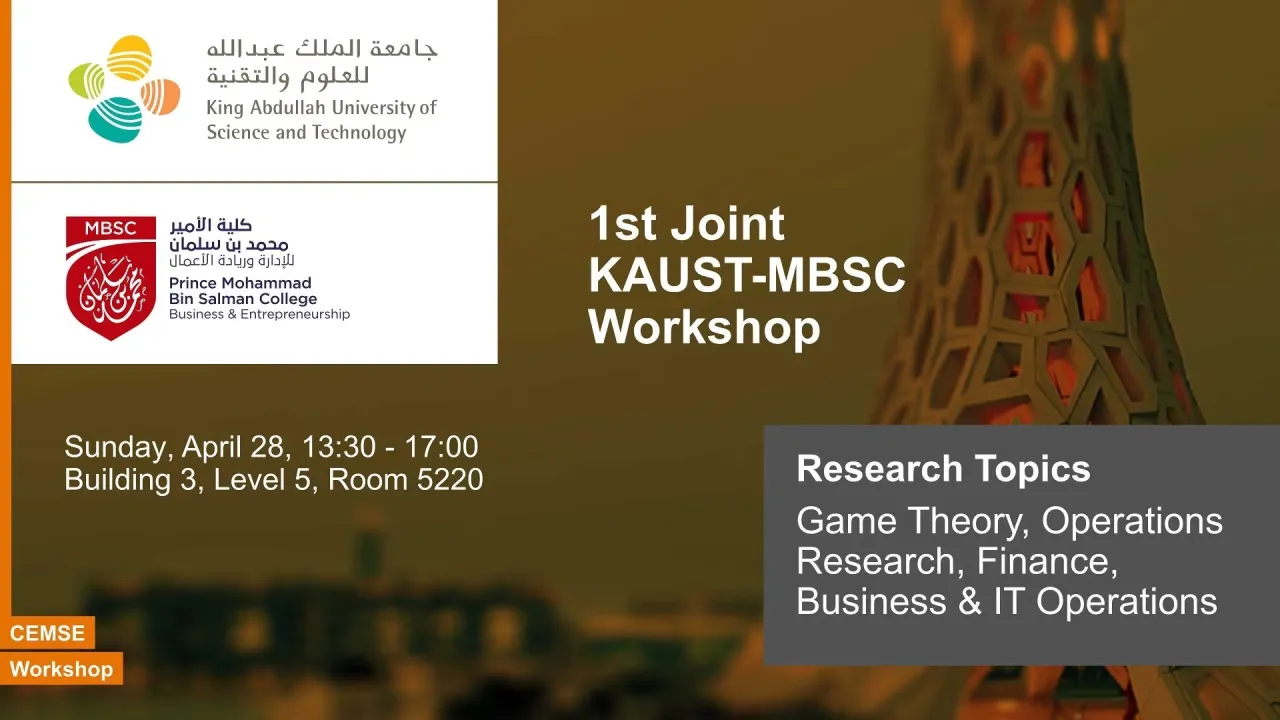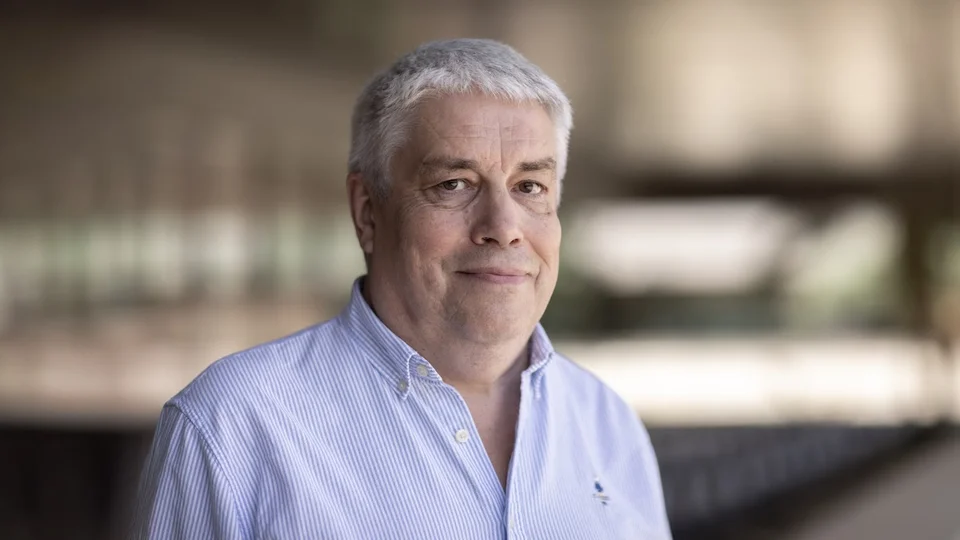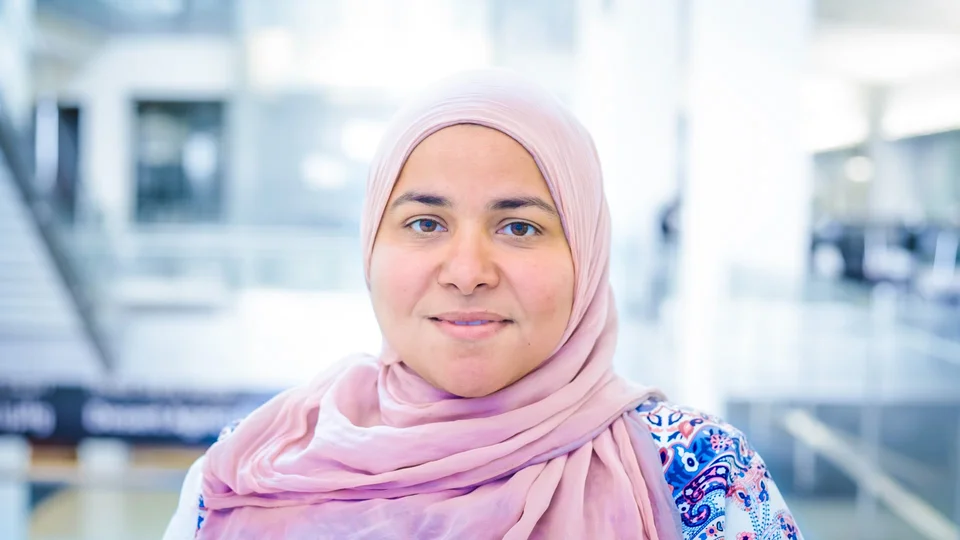
1st Joint KAUST-MBSC Workshop
B3 L5 R5220
The first joint workshop between KAUST and Prince Mohammad Bin Salman College (MBSC). Presenters from both institutions will introduce their research projects in areas such as Game Theory, Operations Research, Finance, and Business & IT Operations. To download the Workshop's Program and Abstract Book click here.
Overview
The first joint workshop between KAUST and Prince Mohammad Bin Salman College (MBSC). Presenters from both institutions will introduce their research projects in areas such as Game Theory, Operations Research, Finance, and Business & IT Operations.
Workshop Program
About Speakers and Talks
Title: Introduction
Brief Bio
E.N. (Mootaz) Elnozahy is currently the Dean of the Computer, Electrical, and Mathematical Sciences and Engineering at KAUST. Prior to arriving at KAUST, Mootaz spent 15 years at IBM Research. He started his career as an Assistant Professor at Carnegie Mellon University in 1993. His research interests are generally in systems, with specific interests in computer system architecture, operating systems, distributed systems, reliable computing, and high performance computer systems. His early work contributed to a defining paper about rollback-recovery in distributed systems. He also built the first low-power server in 2000 at IBM. He led IBM’s participation in the DARPA’s HPCS program, which culminated in 2012 with a machine that outperformed system level benchmarks by three orders of magnitude.
Title: Introduction
Brief Bio
Dr Nikolaos Tzokas earned his PhD in Marketing Management from the University of Bath, UK as well as an MBA from the Athens University of Economics and Business, Greece. His research focuses on value co-creation through new product development, relationship marketing and knowledge management that permeates throughout the organisation. For his research he received over £5m external funding from sources such as the UK’s Economic and Social Research Council (ESRC) and the European Union’s Interreg, Marie Skłodowska Curie and Horizon 2020 programmes. Dr Tzokas was the Dean of the Norwich Business School at the University of East Anglia (UEA) for the period 2004-2010 and the Executive Dean of the Faculty of Business at the University of Plymouth, UK for the period 2014-2018. Currently his is the Chair of the Research & Impact Committee at the MBSC.
Title: From Computational Biology via Logistics to Health Value Creation
Abstract
The Sustainable Development Goals (SDGs) drive many of the global societal agendas. SDG 4 is to provide Universal Access to Healthcare for All and addressing the burden of disease caused by infectious diseases is an main sub goal. The burden caused by the neglected tropical diseases (NTDs) is as high as the burden caused by each of the 'Big 3' HIV/AIDS, Malaria, and TBC. In this presentation we consider the NTD Sleeping Sickness (HAT). We present a new econometric prevalence model, which we subsequently use to analyse elimination of the disease via screening and vaccination. Next, we consider the optimization of mobile screening teams deployment and the capacity needed to achieve zero prevalence (elimination) for a case study in the DRC. We present both exact (non-polynomial) approaches, as well as simple 'practically optimal' policies, which can be readily implemented. The research is partially funded by the Bill and Melinda Gates Foundation.
Brief Bio
Joris van de Klundert (1967) holds an MSc in Management Informatics from Erasmus University Rotterdam, and a PhD in Operations Research from Maastricht University. For Maastricht University he co-founded university spin off company Mateum, and the Venlo Campus, and served as a full professor of Value Chain Optimization from 2007-2008. From 2009 to 2017 he served as chair of the department of Health Services Management at Erasmus University Rotterdam, and as Vice Dean of Education of the Erasmus School for Health Policy &
Title: Stochastic Evolutionary Dynamics: A Graphical Reformulation of Evolutionarily Stable Strategy (ESS) Analysis
Abstract
We propose a novel graph-based reformulation for the concept of evolutionarily stable strategies. Evolutionarily stable strategy (ESS) analysis cannot always explain the long-term behavior of a natural selection-mutation process. Stochastic stability is a more general analysis tool as compared to ESS analysis because it can precisely characterize long-term stochastic behavior. However, one of the reasons why ESS analysis is still widely popular is its computational simplicity. Our objective is to provide a balance between the convenience of ESS analysis and the generality of stochastic stability. The fundamental object in our development is the transitive stability (TS) graph of an evolutionary process. From the TS-graph, we show that we can efficiently compute the smallest set of strategies that always contains the stochastically stable strategies (SSS) for a particular class of evolutionary processes. In particular, we prove that each terminal class of the TS-graph is potentially a stochastically stable group of strategies. In case there is a unique terminal class, then it corresponds exactly to the set of SSS. In case there are multiple terminal classes, then these contain the set of possible SSS, and we show that a unique determination is impossible without higher order analysis.
Brief Bio
Jeff S. Shamma is a Professor of Electrical Engineering at the King Abdullah University of Science and Technology (KAUST) and the Director of the Center of Excellence for NEOM Research at KAUST. Shamma received a Ph.D. in systems science and engineering from MIT in 1988. He has held faculty positions at the University of Minnesota, The University of Texas at Austin, and the University of California, Los Angeles, and was the Julian T. Hightower Chair in Systems & Control in the School of Electrical and Computer Engineering at Georgia Tech. Shamma is a Fellow of the IEEE and the International Federation of Automatic Control, and a recipient of the NSF Young Investigator Award, AACC Donald P. Eckman Award, and the Mohammed Dahleh Distinguished Lecture Award. Shamma is currently the deputy editor-in-chief for the IEEE Transactions on Control of Network Systems and a Distinguished Lecturer of the IEEE Control Systems Society.
Title: Parabolic Free Boundary Price Formation Models
Abstract
We present and analyze a free boundary model for price formation in single-goods markets. The PDE system has features of mean-field games but is simple enough to give very precise information on the long time behaviour of the market price.
Brief Bio
Professor Peter Markowich focuses his research on deepening the understanding of the mathematical and numerical analysis of partial differential equations (PDEs) and their application in physics, biology, and engineering. Markowich earned an M.S., a Ph.D. and the Habilitation for Applied and Numerical Mathematics at the Vienna University of Technology (TU-Wien), Austria. He became Full Professor at the Technical University of Berlin (TUB) in 1989. From 1999 until 2007 he worked at the University of Vienna, Austria, as Professor of Applied Analysis and from 2007-2011 at the University of Cambridge, UK, as Professor of Applied Mathematics. Since 2011 he is Distinguished Professor at the King Abdullah University of Science and Technology, Thuwal, Saudi Arabia.
Title: Patterns of Venture Capital Investment
Brief Bio
Pablo Martin de Holan research, broadly speaking, focuses on the unintended consequences of social action, and how organizations often aim for A but obtain B. He loves to apply his research to concrete managerial problems and help organizations (and students and managers) reach their goals.
Title: Blind matching algorithms for decentralized assignment markets with epsilon-stability solutions and generic agreement functions.
Abstract
We formulate two-sided matching problems defined solely by agents’ aspiration levels and agreement functions: Agents maintain aspiration levels which are an abstraction of their potential utility from a match; an agreement function indicates to two agents on the opposite side of the market whether their current aspiration levels are agreeable. Our simple formulation is shown to encompass many well-known matching problems. Our solution concept is a modified notion of pairwise stability such that the payoff vectors, the aspiration levels, cannot be epsilon-improved upon by any pair of players. Next, we propose a blind matching algorithm (BLMA) to produce a matching and stable aspiration levels in a decentralized matching market where information exchange is severely impaired and where there is no central authority to regulate the market. BLMA is characterized by random activations of agents, and by generic negotiation and aspiration (utility) update processes. We prove the solution produced by BLMA converges to an epsilon-pairwise stable outcome with probability one. Finally, we consider some interesting variations on the matching problem such as the extension to the many-to-one markets and characterizing the set of stochastically stable matchings.
Brief Bio
Doha Hamza is a postdoc at the Robotics, Intelligent Systems and Control (RISC) lab at KAUST. Doha received the B.S. degree in electrical engineering from Alexandria University, Egypt, and the M.S. degree in wireless communications from Nile University, Egypt. She received her PhD in electrical engineering from KAUST in 2014. Doha’s research interests are in matching theory, decentralized matching markets, stochastic stability analysis of matching markets, learning in games, game-theory application to the smart grid and to wireless communications, dynamic spectrum access and cognitive radio networks.
Title: Learning in Zero-Sum Games Revisited: From von Neumann to Poincaré, Hamilton and Legendre
Abstract
We revisit one of most classic questions in game theory and online learning. How do standard learning dynamics such as multiplicative weights update, gradient descent, and follow-the-regularized-leader behave in zero-sum games? The standard textbook answer to this question is that these dynamics "converge" in a time-average sense to Nash equilibria. We provide some interesting insights about the day-to-day behavior. The continuous-time analogues of these dynamics (e.g. replicator dynamics) are Poincaré recurrent. Informally, the trajectories are "cycles" of constant Bregman distance from the Nash equilibrium which lies at the center of the "cycle". In fact, the dynamics are formally Hamiltonian with a hidden energy function that remains constant on all trajectories. This function is the summation of the convex conjugates (i.e. the Legendre–Fenchel transformations) of the regularizers of the two agents. These results extend in a natural way to all affine, network generalizations of zero-sum games. In discrete-time, these algorithms move tangentially to these cycles and as a result they diverge away from Nash equilibria, contradicting the "convergence to equilibrium" paradigm. We also briefly discuss implications on fast convergence of regret to zero (e.g. at \Theta(1/T) for continuous time dynamics, and \Theta(1/sqrt{T}) for discrete-time dynamics with *fixed* step-size).
Brief Bio
Dr. Piliouras is an assistant professor at the Singapore University of Technology and Design (SUTD). He received his PhD in Computer Science from Cornell University in 2010. He has held postdoc positions at the Georgia Institute of Technology (GaTech, ECE Dept.) and California Institute of Technology (Caltech, Dept. of Computing and Mathematical Sciences). He has held visiting positions at UC Berkeley and DeepMind and he is a collaborator of the Ethereum Foundation. He is the recipient of a Singapore NRF Fellowship (2018) and a Simons/UC Berkeley Fellowship (2015).
Title: Poverty Alleviation through Entrepreneurship
Brief Bio
Dr Haya Al-Dajani is a Professor of Entrepreneurship and Director of the Signature Learning Experience (SLE) at the Mohammed Bin Salman College for Business and Entrepreneurship (MBSC). Prior to joining MBSC, Haya’s academic career over the past 10 years was at the University of East Anglia and the University of Plymouth in the UK. She earned her PhD from the UK Hunter Centre for Entrepreneurship at the University of Strathclyde in 2007. Since then, she has secured over two million GBPs in research funding from world leading international funding bodies, and her award winning research focuses upon the intersectionality of gender, entrepreneurship and empowerment, and their collective impact on sustainable development. Haya co-chairs the international Gender and Enterprise Network (Special Interest Group of the Institute for Small Business and Entrepreneurship), is a member of Editorial Boards of leading entrepreneurship journals, and an advisor to a number of entrepreneurship education, research and policy centres around the world.
Title: Accelerating Kidney Allocation in the US
Abstract
About 20% of available kidneys in the US that could be potently transparent are discarded. Placing organs quickly might increase utilization by decreasing discards. We proposed a new organ allocation scheme introducing simultaneously expiring offers, where the kidney is offered to multiple hospitals instead of one. We simulated making simultaneously expiring offers to multiple centers, where every center must accept or decline within the same 1 hour. Simultaneously expiring offers would burden centers to evaluate offers that might otherwise never have come to their center. We also estimated the additional workload caused by one new allocation scheme.
Brief Bio
Michal Mankowski is a Ph.D. Candidate in Computer Science at King Abdullah University of Science and Technology. He earned a BS and MS from the Warsaw University of Technology, Poland. Later, he worked for the Polish Transplant Coordinating Centre under the Polish Ministry of Health. His interest covers Operation Research with a focus on dynamic programming and health care applications. Jointly with collaborators from Johns Hopkins University, Baltimore, MD, he researches on organ transplantation policies.
Brief Bio
Dr. Erman Coskun is a full professor of Management Information Systems and Information Technology. He has an academic career of over 18 years, having held positions in the United States, Turkey, and Cyprus. Dr. Coskun’s research is focused on Complexity of Information Systems, Human-Computer Interaction, Business Analytics, Business Intelligence, Enterprise Resource Planning, Port and Transportation System Efficiency, and Disaster and Crisis Management. Dr. Coskun has held a variety of managerial and administrative positions in both Sakarya University, Turkey and Lemoyne College, USA including serving as the Founding Chair of Sakarya University’s Management Information Systems department and program, the head of Sakarya University’s Quantitative Methods department, deputy chair of Social Sciences Institute. Currently he is serving as a consultant for a financial credit scoring institution and an ERP software development company. Dr. Coskun earned his doctorate in Engineering Science and his Master’s in Industrial and Management Engineering from Rensselaer Polytechnic Institute in NY, USA. He also holds an MBA in Management Science and Quantitative Methods from Pace University NY, USA as well as an MS and BBA from Istanbul University, İstanbul, TURKEY.
Title: Implementation of a finite-difference scheme for Hamilton-Jacobi equations with arbitrary domains
Abstract
In this presentation, we focus on stationary first-order Hamilton-Jacobi equations with arbitrary two-dimensional domains. Our aim is to implement a finite-difference scheme that satisfies monotonicity, consistency, and stability properties. Due to the Barles-Souganidis result, the scheme locally uniformly converges to a unique viscosity solution of the Hamilton-Jacobi equation. To solve the scheme numerically, we use the Euler map with some initial guess. We illustrate our numerical results in several examples.
Brief Bio
Serikbolsyn Duisembay is a PhD student at KAUST. He received his M.S. degree in AMCS from KAUST in 2018 and B.S. degree in Electrical Engineering from Nazarbayev University, Kazakhstan. His current research interests include forward-forward mean-field games, numerical analysis of Hamilton-Jacobi equations and mean-field games with fractional time derivative.
Title: Mean field game price models
Abstract
In this short talk, we give a brief introduction to mean-field game price formation models. We discuss the formulation of the problem as an equilibrium problem between a large number of rational agents. Then, we establish the existence of an equilibrium price. In the linear-quadratic case, we obtain explicit formulas.
Brief Bio
Diogo Gomes is Professor of Applied Mathematics and Computational Science (AMCS), and from 2018 also Chair of the AMCS Program. Professor Diogo Gomes received his Ph.D. in Mathematics from the University of California at Berkley in 2000 and was awarded a Habilitation in Mathematics from Universidade Tecnica de Lisboa in 2006. Before joining KAUST, Professor Gomes has been a Professor in the Mathematics Department at the Instituto Superior Tecnico since 2001.Prof. Gomes' work focuses on nonlinear partial differential equations, with particular emphasis on Hamilton-Jacobi equations, elliptic and parabolic PDE, and mean-field games. His research encompasses both classical PDE questions such as well-posedness, existence and uniqueness, and regularity theory, and numerical methods and their applications. He is particularly interested in applications of mean-field game models to social sciences, economics, and finance.
Title: Extensions of Dynamic Programming for Multi-stage and Bi-criteria Combinatorial Optimization (joint project with Michal Mankowski)
Abstract
In this presentation, we consider extensions of dynamic programming for the study of combinatorial optimization problems that allow us (i) to describe the whole set of solutions or its essential part, (ii) to count the described solutions, (iii) to make multi-stage optimization relative to a sequence of criteria, and (iv) to construct the set of Pareto optimal points for a bi- criteria optimization problem. We propose fairly universal approach to deal with combinatorial optimization problems which is based on the use of so-called circuits without repetitions. Such circuits represent the sets of elements under consideration and are used by optimization and counting algorithms. We tested our proposed approach on the following combinatorial optimization problems: matrix chain multiplication, global sequence alignment, optimal paths in directed graphs, binary search trees, convex polygon triangulation, line breaking (text justification), one-dimensional clustering, and optimal bitonic tour.
Brief Bio
Mikhail Moshkov is professor in the CEMSE Division at King Abdullah University of Science and Technology, Saudi Arabia since October 1, 2008. He earned master’s degree from Nizhni Novgorod State University, received his doctorate from Saratov State University, and habilitation from Moscow State University. From 1977 to 2004, Dr. Moshkov was with Nizhni Novgorod State University. Since 2003 he worked in Poland in the Institute of Computer Science, University of Silesia, and since 2006 also in the Katowice Institute of Information Technologies. His main areas of research are complexity of algorithms, combinatorial optimization, and data mining. Dr. Moshkov is author or coauthor of seven research monographs published by Springer.
Workshop's Program and Abstract Book
View the Workshop's Program and Abstract Book.



